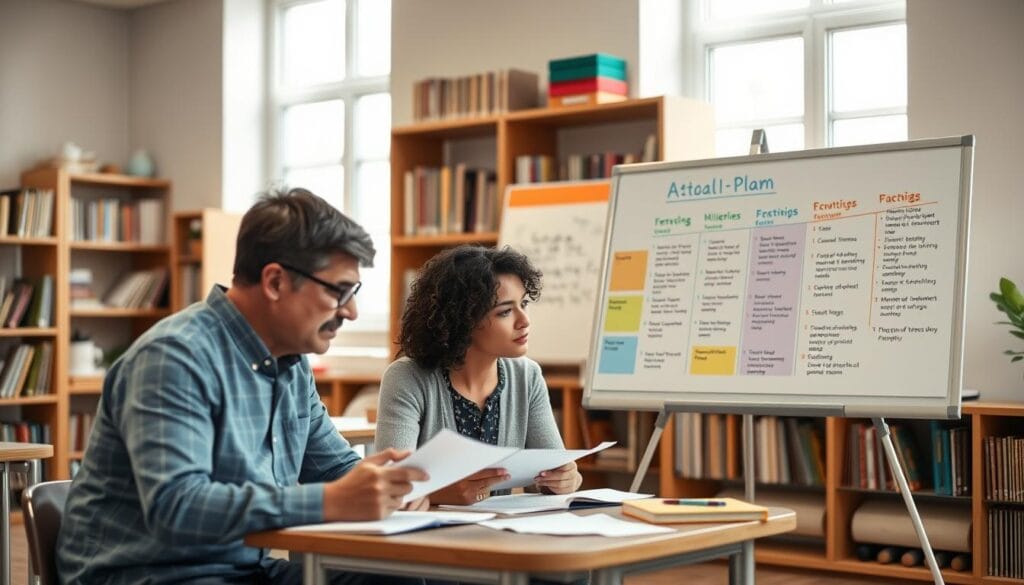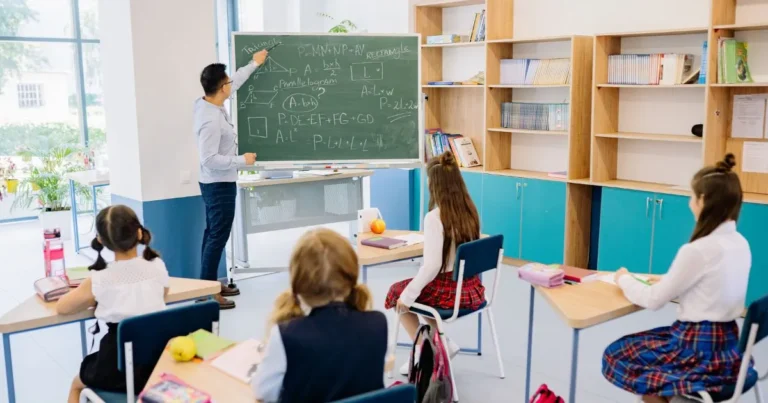How to Prepare for a Parent Teacher Meeting
Every parent wants to help their child succeed in school. A Parent Teacher Meeting is a key time to connect with teachers. It’s where you can work together to help your child reach their best.
Studies show that when parents get involved, kids do better in school. They get better grades and feel more positive about learning.
Getting ready for a parent teacher meeting is more than just showing up. It’s about building a strong partnership with teachers. This way, you can help your child grow and learn more effectively.
This guide will show you how to make the most of your parent teacher meeting. You’ll learn how to get important information, tackle any problems, and work together with teachers. This will help your child succeed in school.
Whether you’re new to these meetings or have done them before, these tips will help you feel confident and focused. You’ll be ready to make the most of your time with teachers.
Table of Contents
Understanding the Importance of School-Parent Communication
Education is a team effort between schools and families. Research shows how important it is to work together. This teamwork makes a big difference in how well students do.
When parents and teachers team up, students grow a lot. They do better in school and feel more confident. Here are some interesting facts:
- Students with involved parents are twice as likely to get good grades.
- Talking regularly with teachers can make students attend school 25% more often.
- Parents being involved can make learning 50% better.
Benefits of Effective Parent-Teacher Partnerships
Working together at home and school helps students grow. This teamwork brings many benefits:
- Students are more motivated.
- They learn to solve problems better.
- Teachers understand each student’s needs better.
Impact on Student Performance
“When parents and teachers communicate openly, students thrive academically and emotionally.”
Research shows that talking regularly with teachers helps students do well. About 90% of teachers say that talking with parents makes students do better. Students with involved families get better grades and feel more confident.
Building Trust Between Home and School
Building trust takes respect and regular talks. Schools that involve parents see better results. Students do better and feel more positive about learning.
Essential Documents and Materials to Gather
Getting ready for a parent teacher meeting means organizing important documents. Your plan to help your child starts with gathering key information. This information gives a full picture of your child’s school life.
Here are the key documents you should collect before the meeting:
- Academic Records
- Most recent report cards
- Standardized test scores
- Homework samples
- Previous years’ academic evaluations
- Health and Personal Information
- Current immunization records
- Medical info that affects school
- Individualized Education Program (IEP) documents
- Communication History
- Previous letters to teachers
- Emails
- Notes from past meetings
According to the National Education Association, being prepared with documentation can significantly improve the quality of parent-teacher discussions.
You aim to make a folder that shows your child’s whole school story. By organizing these materials early, you show you care about your child’s education. It also shows teachers you’re involved in their learning.
Pro tip: Make copies of all documents and keep a digital backup. This way, you have important info easily and avoid losing original documents.
Creating a Pre-Conference Strategy
Getting ready for a parent-teacher meeting is key. It’s all about planning and thinking ahead. Your strategy can really change how well you talk and understand your child’s school life.
Good parent-teacher partnerships start with planning. Studies show that parents who prepare well have better talks and learn more about their child’s school work.
Reviewing Academic Records
Start by collecting and looking over your child’s school papers. You should get:
- Recent report cards
- Standardized test results
- Homework assignments
- Progress reports
Preparing Questions and Concerns
Make a list of questions to ask. Think about asking about:
- Your child’s school progress
- How they get along with friends
- Any learning problems they face
- Any behavior issues
“The most productive conferences happen when parents come prepared with specific questions and a genuine desire to understand their child’s educational experience.”
Setting Clear Meeting Objectives
Make sure you have clear goals for the meeting. Focus on understanding your child’s school level, finding out what they need, and working together for success. Research shows that when parents talk more, meetings are more useful.
Remember, every student does better with good communication between parents and teachers. With a smart plan, you can make your meeting count and help your child grow in school.
Parent Teacher Meeting: What to Expect
Getting ready for a parent teacher meeting can seem scary. But knowing what to expect can make you feel more confident. These meetings usually last about 15 minutes. They are a key chance for parents and teachers to talk and share information.
“The goal is collaboration, not criticism” – Education Experts
At the meeting, you’ll likely talk about several important things:
- How your child is doing in school
- How they behave and interact with others
- What they’re good at and where they might need help
- How they’re feeling and if they’re interested in learning
Teachers are trained to give helpful feedback. They aim to help your child grow, not criticize them. You’ll hear honest thoughts about your child’s school life and how they’re doing.
Studies show that kids who talk regularly with their parents and teachers do better in school. This meeting is a chance to:
- Learn about your child’s current school life
- Find ways to help them succeed
- Set goals for their future
- Make a plan to keep improving
See the parent teacher meeting as a team effort. It’s about working together for your child’s best.
Developing an Effective Conference Agenda
Creating a detailed agenda is key for a productive parent teacher meeting. Studies show that 75% of teachers find a well-planned agenda keeps talks focused. You aim to make the most of the time, ensuring student progress and teamwork.
Planning your meeting well can greatly help you understand your child’s school path. Focus on these important parts when making your agenda:
- Begin with your child’s positive achievements
- Look over their academic performance
- Talk about specific learning goals
- Discuss areas where they might need to improve
- Make a plan for support
Time Management Strategies
Since conferences are short, managing time well is essential. Prioritize the most critical topics and have specific questions ready. Research shows meetings with a clear agenda are 60% more likely to stay on track.
Key Discussion Points
Focus on your child’s overall progress by looking at:
- What they’re good at and what they struggle with
- How they’re doing socially and emotionally
- How they’re doing in class
- Ways to support them
Documentation Methods
Record meeting insights by taking brief notes and asking the teacher for a summary. About 40% of parents are happy with clear notes and plans. Think about using digital tools or apps for better home-school collaboration.
Effective communication transforms educational experiences, connecting families and educators in supporting student success.
Addressing Academic Performance and Progress

Understanding your child’s academic performance is a team effort. It’s not just about grades. It’s about their overall growth and development.
At parent teacher meetings, you’ll explore your child’s academic journey. You’ll focus on several key areas:
- Comprehensive academic assessments
- Classroom performance evaluation
- Identifying strengths and growth areas
- Creating targeted academic support strategies
“The collaborative efforts between parents and teachers can unlock a student’s true potential.”
Research shows that parents play a big role in a student’s success. Students with involved parents can see up to a 30% improvement in their grades.
When talking about grades, you’ll discuss:
- Standardized test scores
- Classroom participation
- Work sample analysis
- Learning style assessments
Supporting your child’s education is more than just grades. It’s about understanding their learning style and helping them overcome challenges. Open communication and working together are key to helping your child succeed.
Discussing Behavioral Observations and Social Development
Parent-teacher meetings are key to understanding your child’s classroom behavior and social life. They help create a supportive space for your child to grow.
Classroom issues can show a lot about your child’s social and emotional growth. About 20% of kids struggle socially, like making friends or joining in group activities.
Understanding Classroom Behavior
Teachers notice important behaviors that affect learning and social skills. Key topics to discuss include:
- Following classroom rules
- Getting along with peers
- Handling emotions
- Joining in group activities
Social Interactions and Relationships
Social growth is vital for kids’ overall development. Talk about:
- Friendships
- Feeling comfortable in groups
- Talking with classmates
Addressing Concerns Constructively
“Collaboration between parents and teachers can increase positive outcomes by 60%”
When talking about classroom issues, aim for feedback that helps find solutions. Be open-minded, wanting to understand and support your child’s journey.
Remember, celebrating small achievements can boost your child’s motivation and self-confidence by up to 30%. Work together to create a supportive plan that tackles challenges and highlights your child’s strengths.
Creating Action Plans for Student Success

Creating a strategic action plan is key for your child’s growth. A strong partnership between parents and teachers can turn challenges into chances for success. Studies show that when parents help make plans, students can see a 30% improvement in their progress.
To make a good action plan, focus on these important points:
- Identify specific academic support goals
- Set measurable objectives
- Define clear roles for parents and teachers
- Establish a realistic timeline for progress
“When parents and teachers collaborate, students thrive.” – Educational Research Institute
Your plan should cover both immediate and long-term needs. Teachers often highlight three strengths and areas for improvement for each student. Use this information to make strategies that help your child learn better.
- Review current academic performance
- Discuss potential interventions
- Create a structured support system
- Schedule regular progress check-ins
About 20-30% of students need special learning support. Be ready to change your plan as your child’s needs change. The aim is to create a team effort that helps your child achieve their best.
Establishing Ongoing Communication Channels
Good school involvement needs regular and meaningful talks between parents and teachers. Building strong bonds beyond the first meeting is key to a student’s success.
Studies show that keeping in touch can change how students learn. Almost 80% of involved parents feel closer to their child’s school life.
Follow-up Strategies
Having a solid follow-up plan keeps the conversation going. Here are some ideas:
- Set up quick calls or emails every 4-6 weeks
- Use digital tools for updates
- Share news about student wins
- Keep a steady communication flow
Communication Tools and Methods
Today’s tech offers many ways to talk easily. Parents and teachers can use:
- School apps
- Email newsletters
- Special messaging apps
- Online meeting tools
“Communication works for those who work at it.” – John Powell
Regular Progress Updates
Keeping parents in the loop is important. Research finds that 60% of parents like a set communication plan. Giving updates weekly or every two weeks can boost parent involvement by 25%.
Good communication is a team effort. It needs dedication from both teachers and families.
Conclusion
Parent-teacher meetings are key to helping your child succeed in school. Studies show that when parents get involved, students can do up to 20% better. This shows how important it is to work together.
By showing up to these meetings, you’re showing you care about your child’s education. Teachers say these meetings help students do better. So, by being there and asking the right questions, you help your child grow.
Research shows that kids with involved parents are more likely to finish high school and go to college. Each meeting is a chance to plan for your child’s success. It’s a time to talk about what’s going well and what needs work.
Remember, parent-teacher meetings are just the start. They’re a chance to get involved in your child’s education. By being there and supporting them, you can help them achieve great things.








